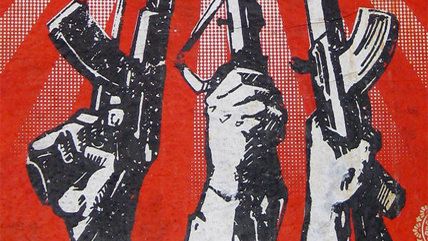Newtown: The Moral Panic That Wasn't
A year later, Newtown's legislative legacy is far less dramatic than it might have been.

One year ago, in the wake of the horrific school shooting at Sandy Hook Elementary in Newtown, Conn., the Obama White House released its agenda for "protect[ing] our children and communities by reducing gun violence." It was a report marked by a tone of grim urgency from its title onward: "Now Is the Time" to tighten background checks for guns, ban "military-style assault weapons," and fortify our schools.
Yet the president appeared comparatively restrained next to the National Rifle Association's Wayne LaPierre, who breathlessly demanded "an active national database of the mentally ill" and federally funded "armed police officers in every school" or Sen. Barbara Boxer, D-Calif., who proposed legislation encouraging governors to call out the National Guard for school shootings. At the time I worried that this legislative panic attack would leave us no safer, and considerably less free.
That's probably for the best, given that the massacre encouraged a flurry of policy proposals whose "prospects for reducing the risks of mass murder are limited." But a year later, Newtown's legislative legacy is far less dramatic than it might have been. At the state level, nearly two-thirds of post-Newtown firearms laws actually loosened restrictions on gun owners. On the federal level, nothing much has happened.
That's the sober, and sobering, conclusion of a new article in the journal Homicide Studies, co-authored by James Alan Fox, the nation's leading criminologist studying mass killing.
In "Mass Shootings in America: Moving Beyond Newtown," Fox and co-author Monica J. DeLateur offer a comprehensive review of the literature, aimed at refuting "myths" surrounding the problem of spree shootings.
It's a myth, for example, that a federal ban on so-called assault weapons will impede shooting sprees: "The overwhelming majority of mass murderers use firearms that would not be restricted by an assault weapons ban," mostly semiautomatic handguns. Those that used weapons covered by a renewed ban "easily could have identified an alternate means of mass casualty."
Enhanced background checks are no more promising, the authors write: "Most mass murderers do not have criminal records or a history of psychiatric hospitalization," and wouldn't be disqualified from purchase. They cite a recent study prepared for Mayors Against Illegal Guns, which found that in only 10 of 93 cases had "concerns about the mental health of the shooter been brought to the attention of" health professionals or legal authorities prior to the shooting.
Attempts to identify would-be mass killers through "telltale warning signs" and improved access to mental health care are also likely to fail: "Profiles and checklists designed to predict rare events — such as mass shootings — tend to over-predict, producing a large number of 'false positives,' " which will potentially do "more harm than good."
Fox, whose focus on mass killing has earned him the moniker "the dean of death," isn't likely to cheer anyone up with this counsel of legislative futility. But the good news, as the authors point out, is that mass shootings are not on the rise — and on an individual basis, the risk remains vanishingly small.
Perhaps the public, in its occasional wisdom, recognizes this. A year after Newtown, it looks like the massive public support for gun restrictions never materialized; a recent Reason-Rupe poll showed 63 percent of Americans doubting that tighter gun laws would keep guns out of the hands of wrongdoers.
Sociologists define "a moral panic" as "an episode, often triggered by alarming media stories and reinforced by reactive laws and public policy, of exaggerated or misdirected public concern, anxiety, fear, or anger over a perceived threat to social order." Thankfully, Newtown turns out to be the moral panic that wasn't.
This column originally appeared in the Washington Examiner.


Show Comments (121)